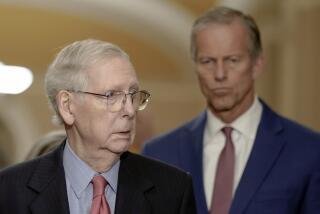Republican presidential candidates make bold right turns
Mitt Romney imposed a healthcare mandate before he opposed it. Tim Pawlenty touted a climate change plan that he now disowns. Ditto Jon Huntsman.
Republican presidential contenders aren’t just debating one another these days. They’re disputing their own decisions and disavowing past positions. Their pirouettes reflect a profound shift in the Republican Party, a rightward turn that will be evident on a New Hampshire stage Monday when seven candidates meet in the first major debate of the 2012 campaign.
Primary contests typically draw presidential candidates closer to their party’s base. And since staunchly conservative voters may have the biggest say in choosing the GOP nominee, it’s hardly surprising that candidates have been moving rightward. But the extent of repositioning by some leading contenders has been unusually pronounced this time.
“When there’s a strong, establishment-backed front-runner, that candidate is usually in a better position to withstand the gravitational pull from the party base,” said Dan Schnur, director of the Jesse M. Unruh Institute of Politics at USC and a former Republican strategist. “Because this race is so unsettled, none of the leading candidates has much strength or stature to resist.”
The perceived influence of “tea party” voters, who helped produce big Republican victories in last year’s elections, has accentuated the swing to the right. So have the actions of the new Republican majority in the House of Representatives and newly elected Republican governors. They are redefining conservatism, by proposing to turn Medicare into a voucher program, calling for draconian cuts in government spending and abandoning cap-and-trade energy alliances once favored by free-market advocates.
Republican presidential candidates have been forced to fall in line, or else. Those who don’t, Schnur said, risk getting flak from “grass-roots activists saying, ‘Why can’t you be more like Chris Christie, Marco Rubio or Paul Ryan?’ ” — a reference to noncandidates who have been begged to get into the race.
Case in point: the unraveling of Newt Gingrich’s presidential campaign, which began after he criticized the Medicare plan proposed by Rep. Paul D. Ryan (R-Wis.) as “right-wing social engineering” — a reversal of Gingrich’s previous support for Ryan’s budget. A resulting conservative uproar had Gingrich scrambling to confess his mistake and apologize personally to Ryan, and sent him into a downward spiral.
So far, Republican strategists argue, the party’s major presidential contenders haven’t strayed too far from the mainstream. But some in the party establishment are worried. Mississippi Gov. Haley Barbour, a former Republican national chairman and, briefly, an undeclared 2012 candidate, has been warning about the dangers of ideological litmus tests. Barbour advised a recent gathering of Christian conservatives that “purity is the enemy of victory” in politics.
At the same time, President Obama, aggressively gearing up for reelection, has compiled his own record of policy reversals. PolitiFact.com, which tracks what it calls “full flops” by prominent political figures, catalogs nine instances in which Obama made 180-degree flips, including his demand that Congress lift the federal debt limit, which he voted against as a senator. His opposition to an individual healthcare mandate became a major point of contention with Hillary Rodham Clinton in the 2008 primaries; once in office, he made it a central feature of his healthcare plan.
But Obama’s repositioning is essentially the opposite of his Republican opponents. Spared a primary challenge, the president started veering away from the left wing of his party after last November’s election, including on issues of national security and government spending. The Republicans are moving farther from the middle as they gravitate toward the heart of their activist base.
For Romney, the nominal Republican front-runner, the journey to the right was already a defining characteristic, feeding a broader narrative about opportunism that developed after he left Massachusetts for a 2008 presidential run. Primary opponents attacked him for abandoning liberal stances on gay rights, gun control and abortion — issues important to the social conservatives who made up 44% of the Republican primary electorate that year.
Now, it’s his healthcare record that’s causing problems. The former governor has refused to renounce the healthcare law he signed, which requires everyone in Massachusetts to obtain insurance or pay a penalty. Couched in terms of personal responsibility, the individual mandate was designed to fix the costly problem of caring for the uninsured. The idea had been supported by Republicans and promoted by conservative think tanks for years as an alternative to a government-run system. Some conservatives were always opposed, though, and once Obama’s mandate — modeled on the Romney plan — became the law of the land, one of Romney’s greatest assets turned into a serious liability.
Romney once said he was proud of the law and called it a success, but last week he had to be pressed three times on CNN to even say whether it had worked. Romney’s grudging reply: “Some parts worked well. Some parts didn’t work well.”
Like Romney, Pawlenty has absorbed conservative criticism for actions in governing a Democratic-leaning state. His most prominent turnabout as a 2012 candidate involves global warming, an issue that, polls show, represents one of the sharpest divides between Republicans and Democrats. Conservative skepticism about climate change has grown over the last few years, with two-thirds of Republicans telling a Gallup poll in March that the seriousness of global warming has been exaggerated. New Jersey Republican Gov. Chris Christie, a rising conservative star, announced last month that he was pulling his state out of a regional cap-and-trade compact, saying it hadn’t worked.
As governor of Minnesota, Pawlenty was a strong advocate of curbing pollution via trading systems, in which power plants, factories and other sources of greenhouse gases that beat government-mandated emission caps can sell permits to companies that exceed them. He made a radio commercial in 2008 with Democratic Gov. Janet Napolitano of Arizona, now a member of Obama’s Cabinet, pleading with Congress to “cap greenhouse gas pollution now.”
But conservative opposition from Sarah Palin and others to what they branded as “cap-and-tax” blocked the measure in Congress. As a candidate for the Republican nomination, Pawlenty has said he was wrong to support cap-and-trade and has apologized, at one point saying it would be “a disaster” for a sluggish U.S. economy.
Huntsman, another former governor turned presidential possibility, also abandoned cap-and-trade, which he had embraced with a flourish. In 2007, he stood with California Gov. Arnold Schwarzenegger at a ceremony that added Utah to the Western Climate Initiative. Today, Huntsman blames worsening economic conditions for his change of heart and says cap-and-trade hasn’t been effective.
But for the most part, Huntsman is sticking with moderate positions on social issues that may well cost him primary votes, including support for civil unions for gay couples and in-state tuition for noncitizen children of illegal immigrants. He appears to be gambling that he can position himself slightly to the left of the other Republicans and turn his opponents’ image-shifting into an advantage.
Describing himself as “a pragmatic problem-solver,” Huntsman recently told ABC News: “I don’t change on my positions. The circumstances change, like on cap-and-trade.”
He characterizes his description of Obama as a “remarkable leader,” in a handwritten thank-you note to the president where he underlined the word remarkable, as nothing more than a social gesture toward the man who chose him to be ambassador to China. But Huntsman’s two years of service to Obama may be a disqualifier in a party that seems in no mood to compromise, as former Gov. John Sununu of New Hampshire indicated the other day when asked whether he might endorse Huntsman.
“I only support Republicans,” Sununu said.
More to Read
Start your day right
Sign up for Essential California for news, features and recommendations from the L.A. Times and beyond in your inbox six days a week.
You may occasionally receive promotional content from the Los Angeles Times.






